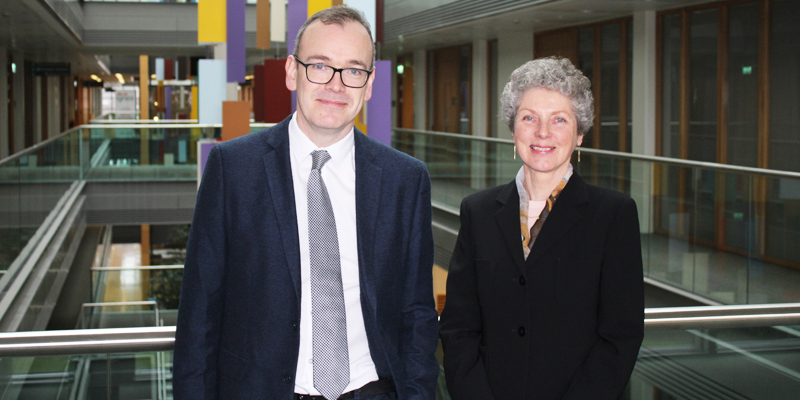In This Section
UCC researchers receive €1.9m to develop new therapeutic solutions for common diseases

Defining what distinguishes the unique actions of insulin and studying the role that certain bacteria play in metabolising bile acids in our guts in people with inflammatory bowel disease are the two University College Cork (UCC) projects to receive funding under the Research Ireland Frontiers for the Future Programme.
The Research Ireland Frontiers for the Future Programme funds high-risk, high-reward research programmes and innovative, collaborative research with the potential to deliver economic and societal impact.
Minister for Further and Higher Education, Research, Innovation and Science, James Lawless TD, today announced a total €23.6 million investment to fund 23 research projects nationwide through the Programme.
New therapeutic solutions for inflammatory disorders
Professor Rosemary O’Connor, Professor of Cell Biology in the School of Biochemistry & Cell Biology, has received €1,275,723 for her project entitled 'Exploiting the spatial actions of metabolic and survival factors for therapeutic benefit.'
This research project addresses the Insulin/Insulin-like growth factor (IGF) system, which is essential for normal development, metabolism, and tissue maintenance, but is disrupted in diabetes, cancer, and inflammatory disorders. From a therapeutic perspective, insulin is widely used to treat diabetes, while drugs that block insulin or IGF activity are disappointingly ineffective in cancer. However, some of these drugs originally developed for cancer have been successfully re-purposed to treat Thyroid Eye Disease (TED) by suppressing inflammation associated with this debilitating condition. The project will investigate the basis for this success in TED and test the rationale for this therapy in other inflammatory disorders.
The project will also aim to resolve the previously unanswerable question of how the insulin and IGF-1 receptors that evolved from a common protein and retain many similarities can mediate quite distinct biological outcomes in cells and tissues. The approach to this is made possible by newly available resources and techniques in cellular imaging, in-cell proteomics and computational protein modelling.
Professor O’Connor said: "This project is at the leading edge of cell signalling research. We aim to define what distinguishes the unique actions of insulin and IGFs in health and disease. It will provide direction for new therapies for inflammatory diseases affecting millions of people."
Opening new avenues for treating Inflammatory Bowel Disease
Professor Aonghus Lavelle, Professor in Clinical Anatomy and Gastroenterologist in the Department of Anatomy & Neuroscience and APC Microbiome Ireland, has received €613,556 for his project entitled 'Characterising uncultured bacteria associated with bile acid dysmetabolism and disease severity in IBD.'
Inflammatory bowel disease (IBD), whose main subtypes are ulcerative colitis and Crohn's disease, are important chronic inflammatory condition of the gastrointestinal tract, affecting an estimated 40,000+ people in Ireland. This research project aims to study the role that certain bacteria play in metabolising bile acids in our guts, particularly in people with IBD. Bile acids are special molecules produced by the liver to help with digestion and absorption of dietary fats. Our bodies reabsorb most of these bile acids after the fats have been digested, but some make it into our colon, where bacteria alter them. These altered bile acids (termed 'secondary bile acids') can have a range of important functions related to health and disease. Previous research at UCC with Professor Harry Sokol’s group in Paris has shown that people with severe IBD have a loss of these secondary bile acids and we have identified a corresponding loss of particular bacteria using gene sequencing techniques that appear to explain these findings. This study is going to recruit people with and without IBD and attempt to culture (or grow) these bacteria from their guts.
Professor Lavalle said: "This project will allow us to determine if these bacteria and the secondary bile acids they produce are important in the disease course of patients with IBD. The goal will then be to establish that re-introducing these bacteria is a viable therapeutic strategy, thus opening up a new avenue for treating IBD."
Announcing the awards, Minister Lawless said: "The Research Ireland Frontiers for the Future programme supports the development of world-class research across a range of disciplines. The awardees – spanning 9 research institutions nationwide – have brought forward novel and innovative ideas with strong potential to deliver impactful solutions for major challenges facing society today. The programme itself promotes gender balance and provides opportunities for emerging investigators returning to research. I look forward to seeing the awardees’ progress over the coming years."
Welcoming the announcement, Celine Fitzgerald, Interim Chief Executive of Research Ireland, commented: "Our Frontiers for the Future Programme is driven by feedback from the research community and represents a strong commitment to developing future talent in key areas. These 23 awards will fund a total of 86 research positions, comprising Postdocs, PhDs, Research Assistants and support staff. I am very pleased with the opportunities that this targeted investment is creating and greatly encouraged that crucial research on pressing issues will be facilitated as a result."
Professor John F. Cryan, UCC Vice President for Research and Innovation said: "Congratulations to Professor Rosemary O’Connor and Professor Aonghus Lavalle on receiving a Research Ireland Frontiers for the Future Programme award. UCC is a world leading institution in delivering research focused solutions to major societal and healthcare challenges. These awards further strengthens UCC’s research reputation in Future Medicines, a key thematic area of our UCC Futures framework."
